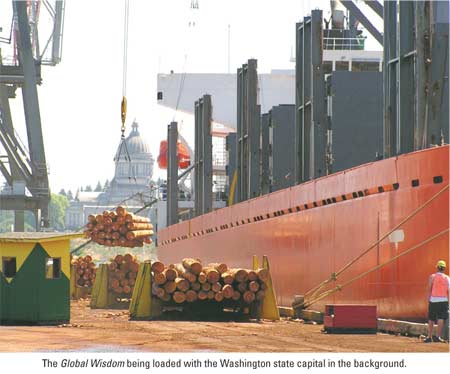
Logs roll through the Port of Olympia
By Leo Quigley, AJOTThe log business at the Port of Olympia, WA, is on a roll now that Weyerhaeuser has completed the transfer of its log exporting business from Tacoma and Grays Harbor, WA, to the state capital.
While the magnitude of the business in not as large as it was at one time in port’s history, it’s enough to allow Olympia to increase the level of employment on the waterfront while other West Coast ports are laying people off.
In addition to the new Weyerhaeuser log handling facility, owned by the port, there are two other log operators at the port, Pacific Lumber & Shipping and Merrill & Ring and Holbrook Inc. that are now starting to look at growing the Korean market for logs.
With the amount of experience that exists and Olympia’s central location the port is becoming the center of the log exporting business in the Northwest.
Jim Amador, Business Development Manager at the port, said the Weyerhaeuser log export facility started operations at the beginning of the year with the arrival of the first vessel, but did not go into full-scale operation until May of this year.
“We’re anticipating a vessel a month with Weyerhaeuser,” Amador said. But, there’s a possibility that this could become a vessel once every three weeks.
“He said the port is also expecting a barge of logs per month from Canada.
Vessels visiting the port to pick up logs include the Global Wisdom owned by NYK Line and the Lavieen Rose owned by Mitsui SK, which are capable of loading 5 ½ to 6 million board feet. As well, the Dry Beam owned by Toyo Shipping Line stops at Port of Olympia and a second Toyo vessel, the Eternal Athena is expected to visit the port later this year. All of these bulk vessels carrying logs are destined to Japan.





